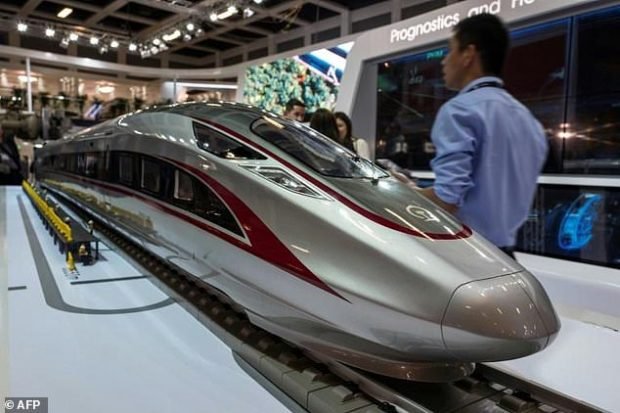Rebuttal of British “analysts” global power delusions
A British blogger has recently published a post on the ConservativeHome website wherein he claims, based on rubbish produced by two British pseudo-analysts, that Britain is a global power and the second most important country in the world.
The two pseudo-analysts he borrows his opinion from base their claim on utterly false “reasons.” They claim, inter alia, that the size of a country’s economy and population don’t matter, and that Russia’s and China’s militaries are inferior to those of Britain and France and have nothing but obsolete equipment and poorly trained troops.
All of this is utter garbage, and I’ll show you why.
Firstly, the Russian and Chinese militaries in fact wield very large quantities of modern weaponry – which is as good or, in some cases, even superior to British and French weapons. This is particularly true in the field of submarines, surface combatants, and missiles.
The Russian and Chinese Air Forces are equipped with hundreds of modern, highly-capable Flanker (Su-27/30/35/J-11/J-16) and MiG-29 Fulcrum jets, as well as almost 200 MiG-31 high-altitude interceptors in Russian service. They also have (individually) more tanker and airborne early warning aircraft than Britain or France have. Their ground forces have very modern and potent tanks (Type 98 and T-90), IFVs, APCs, and other ground weapons, and far more reliable rifles (Kalashnikovs) than the standard rifles of the British (SA80) and French (FAMAS) Armies.
The Russian and Chinese navies have large numbers of modern surface combatants such as the Sovremenny and Type 051/052 classes (the latter being called the Chinese Aegis but in fact being far more capable than the US Arleigh Burke, British Daring, or European Horizon class) and their various (Burevestnik, Gorshkov, Jiangwei, etc.) frigate classes. Both Russia and China also have an aircraft carrier, and both plan to build more of these. Both also operate ultra-quiet conventional and nuclear-powered submarines (e.g. the Kilo, Lada, Song, Yuan, Akula, Yasen, and Type 095 classes). China also has more than enough amphibious assault ships to invade Taiwan and any other island in the Western Pacific, and Russia has four modern French Mistral class amphibs on order.
Russia and China also have large quantities of air-, ground-, and sea-launched land-attack cruise missiles of the Kh-55, Kh-101/102, DH-10, CJ-10, and Hongniao families and the platforms to deliver them. They also possess thousands of supersonic Sunburn, Sizzler, and Yingji family anti-ship cruise missiles. One Sunburn or Sizzler would suffice to sink an American supercarrier. They also have thousands of short-range, and over a hundred medium-range, ballistic missiles (DF-11, DF-15, DF-21, DF-25, DF-3, DF-4, Iskander, Yars-M).
Moscow and Beijing both also wield potent ballistic missile defense systems, highly sophisticated and redundant Air Defense Systems (SA-11/17, S-300, S-400, HQ-9), dozens of anti-satellite weapons (which China has tested twice), laser weapons, and a class of arms that neither Britain nor France has or will ever have, and which even the US has only tested and not deployed – hypersonic Prompt Global Strike Weapons like the one China tested on January 9th. These will allow Moscow and Beijing to strike any target anywhere in the world within an hour or less – and the target would be unable to defend itself from such attack, for the missile would be way too fast (flying at 5 or more times the speed of sound!) to intercept.
And that is to say nothing of Russia’s and China’s large, modern, and growing nuclear arsenals, Russia wielding 6,800 nuclear weapons and China between 1,600 and 3,000. Britain’s and France’s nuclear arsenals are so small (200 and 300 warheads, respectively) that both Russia and China could easily destroy these tiny, meager arsenals in a single preemptive strike. It is only because of the US nuclear umbrella that they haven’t done so. Britain’s entire nuclear deterrent consists of 4 ballistic missile submarines, only one of which is ever at sea – and given how noisy those submarines are, they would be quite easy to find. Russian ASW ships and aircraft would have no more trouble finding the single French ballistic missile sub on patrol.
Now, how do European militaries compare? With the partial exception of France, the less is said about European militaries – including that of Britain – the better.
Britain has no maritime patrol aircraft (the last ones, the Nimrods, have been retired, ostensibly on cost grounds), no aircraft carriers, no bombers, no conventional submarines, and no ground-launched cruise or ballistic missiles. It has only 3 amphibious assault ships (one of which is due to be decommissioned in a few years), 7 attack submarines, 6 destroyers, and 13 frigates. That, plus the Antarctic patrol ship Endurance, 15 minesweepers, and auxiliaries, is basically all that’s left of Britain’s once-mighty Royal Navy.
The problems continue with the RAF and the British Army. They have only 160 fighters (all of them inferior to the Flankers), a dozen tankers, a few AWACS aircraft, 200 tanks, and a paucity of artillery pieces.
France’s military fares somewhat better. It has a nuclear-powered aircraft carrier, two legs of a nuclear deterrent, deadly transonic anti-ship cruise missiles, and does have maritime patrol aircraft (Atlantique-2 and Falcon). Whenever its aircraft carrier, Charles de Gaulle, sets sail, France can project power anywhere in the world.
But that capability is put on hold whenever the ship returns to port, and otherwise, France’s military has had serious trouble projecting power abroad, as recent French military operations have demonstrated. France is woefully short on tankers, AEW and transport aircraft, and even strike jets (and doesn’t have intercontinental bombers), as demonstrated by its recent ops in Libya and Mali – forcing France to rely on the US on these aircraft and munitions in both cases (except that the US refused to provide strike aircraft in Mali). Yet, the new French White Paper on Defense envisages even more cuts in all these categories of aircraft! The French Air Force is to have no more than 180 fighters and attack jets, and the Navy no more than 45!
In fact, the tragic weakness of the British, French, and other European militaries was revealed for the whole world to see in both Libya and Mali (as well as in Kosovo a decade earlier). European militaries had a shortage of strike, AEW, and tanker aircraft as well as munitions, forcing the US to fill the gap. In Libya, as in Kosovo 12 years earlier, the US had to fly not only the vast majority of combat missions, but also all the AEW, intel-surveillance-recon, and aerial refueling missions.
So no, Britain no longer has any global military capabilities and is absolutely not a global military power any longer.
Don’t take my word for it. Listen to Royal Navy admirals. The late Admiral Sandy Woodward, the man who recaptured the Falklands from the Argentines in 1982, said a few years ago that Britain could not repeat this feat today because of successive governments’ massive defense cuts. Rear Admiral Alan Massey, a former skipper of the now-decomissioned HMS Ark Royal, wrote in an official report in 2008 that the Royal Navy would struggle to repeat its role in the Iraq War! And that was in 2008 – BEFORE the Cameron government’s draconian defence cuts!
So not only is the British military tiny and poorly equipped, it can no longer project power beyond the region of Europe. Therefore, it is not a global military power in any sense of the word.
The two pseudo-analysts whose screed I’m refuting here claim that the UK and France have bases around the world and that makes them global military powers. Firstly, bases are useful only if you have something meaningful to project from them. Secondly, how many military bases does the UK have in North America? How many in East Asia? How many in Africa? How many in the South Pacific? How many in the Persian Gulf? That’s right – zero.
(France does have a number of bases in Africa, as well as some in the Persian Gulf, the South Pacific, the Carribean, and the Indian Ocean. Once again, France’s military is a better position to project military power than Britain’s.)
So, despite those two British pseudo-analysts claiming that global power projection capabilities, and not raw numbers of tanks, planes, ships, and missiles, are meaningful metrics of military power, Britain has been found badly wanting on this criterion as well.
Moreover, size and quantity do matter, too – and far more than those British pseudo-analysts appreciate. A small or mid-sized country can, if it dedicates enough resources and uses them wisely, become very powerful in its own backyard and punch above its weight in that region. Israel and North Korea are examples of that.
But only big economic and military powers can exercise power GLOBALLY. Currently, only the US, Russia, and China can do that. These are the three most important countries in the world. Britain, France, and others simply do not have the size or the mass to exercise power on a global scale.
And contrary to those pseudo-analysts’ claims, size and quantity have mattered throughout history. They claim France never beat Britain in the 18th or 19th century, despite having a far larger populace and economy. But this is also utterly false: France did beat Britain handily in one war, namely, the American War of Independence. Without French aid, the American Revolution would’ve been quelled by 1780 (and it almost was), because the Americans simply didn’t have the critical mass to defeat the British at that time. Washington’s entire strategy was to keep fighting, or at least keep his army intact, until the French would intervene.
As for France’s eventual defeat in the Napoleonic Wars, it took several coalitions and over 15 years of fighting to accomplish that. And most of the heavy lifting was done by the continental armies of Russia, Prussia, and Austria plus the Spanish guerillas. As Austrian Emperor Francis I said, “The English traffickers of human flesh. They pay others to fight in their place.”
This was after the battle of Austerlitz, where the Austrians and the Russians fought the French because the British Army was too inferior to do a one-on-one battle with the French. So a coalition was formed against France, and the UK government contracted a huge amount of debt to pay the Austrians and the Russians to fight Napoleon… and they still lost to the superior French army, by the way.
In fact, Britain was able to punch above its weight for over two centuries solely because of its mastery of diplomacy and coalition-making, as well as appreciation of the Royal Navy’s importance – all traits that the current UK government sorely lacks.
Throughout history, small and midsized countries have often put up fierce resistance in their independence’s defense, and have sometimes been able to punch above their weight (again, refer to Israel and North Korea). But only big countries with large economies, militaries, and populations can exert global military, economic, and geopolitical influence.
Last but not least, look at who has actually been geopolitically successful in the last two years: Russia and China. Russia has opened a port in the Med, deterred the US from atttacking Syria, sheltered Edward Snowden while daring the US to capture him, clawed Ukraine away before it could begin integrating with the West, bribed Ukrainian oligarchs with 17 billion dollars, set up bases in the Arctic, and tested IRBMs in defiance of the INF Treaty. China has tested a hypersonic global strike weapon and an ASAT missile, declared an ADIZ around the Senkakus and an exclusive fisheries zone around the Spratlys, and shielded Kim Jong-un from any consequences of his provocations while stealing tons of data from US weapon programs.
To sum up, only big heavyweights can exercise global power. Small and midsized countries cannot. And Britain, with its total lack of global military power projection capabilities, is most certainly NOT a global power in any sense of the word.
It’s time for the Brits to stop deluding themselves that the UK is a global power, when it isn’t.




